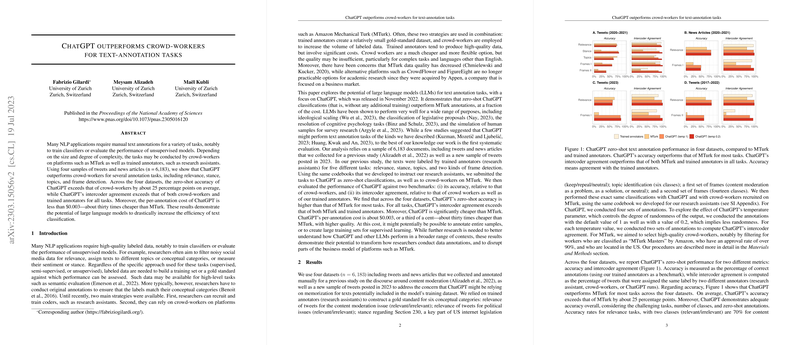ChatGPT Outperforms Crowd-Workers for Text-Annotation Tasks
The paper "ChatGPT outperforms crowd-workers for text-annotation tasks" presents a thorough evaluation of ChatGPT as a tool for performing various text annotation tasks. The research compares the performance of ChatGPT against that of human annotators, both trained research assistants and crowd-workers on platforms like Amazon Mechanical Turk (MTurk). The paper provides compelling evidence in favor of utilizing LLMs for tasks traditionally dependent on human annotation.
The paper evaluates ChatGPT across four datasets composed of tweets and news articles, featuring a total of 6,183 entries. Annotation tasks included relevance, stance, topic identification, and frame detection. A notable metric throughout the paper is ChatGPT's zero-shot classification performance, which does not involve any additional task-specific training. This approach notably surpasses the results obtained through MTurk, with an average increase in accuracy by approximately 25 percentage points.
Key Findings
- Accuracy and Agreement: ChatGPT exhibits superior accuracy and intercoder agreement compared to MTurk and even trained annotators. Across the datasets, ChatGPT's accuracy consistently outperformed MTurk, reaching a variance of about 25 percentage points on average. Its intercoder agreement rates were impressive, reaching up to 97% under certain configurations.
- Cost Efficiency: The paper highlights the economic advantage of ChatGPT, with a negligible per-annotation cost of less than $0.003. This cost efficiency is a fraction—approximately thirty times cheaper—of the expenses incurred using crowd-sourced services like MTurk, making ChatGPT a highly viable option for large-scale annotation tasks.
- Consistency of Performance: With varying configurations such as the temperature parameter, ChatGPT demonstrated remarkable consistency and reliability in text annotation, suggesting practical applicability across different contexts.
Implications and Future Directions
The implications of these findings are significant for both the academic and commercial spheres, as they suggest a paradigm shift in how text annotations can be performed. The paper emphasizes the potential of LLMs to not only enhance efficiency and reduce costs but also to maintain or even improve the quality of text annotations.
The use of ChatGPT in multilingual contexts, particularly in domains requiring nuanced understanding, remains an area ripe for exploration. Further research could delve into:
- Implementation of few-shot learning for specific domains
- Integration of semi-automated labeling systems, enhancing model recommendations based on human input
- Comparative analysis of diverse LLMs to ascertain domain-specific advantages
Conclusion
The paper on ChatGPT's performance in text annotation tasks signifies a notable advancement in the capabilities of artificial intelligence in natural language processing. By achieving higher accuracy and agreement at a lower cost, ChatGPT and similar LLMs hold the promise of transforming traditional data annotation methodologies and challenging existing crowdsourcing paradigms such as MTurk. Through continued exploration and validation across varied tasks and languages, LLMs like ChatGPT could become pivotal tools in the evolving landscape of AI-driven text analysis.
